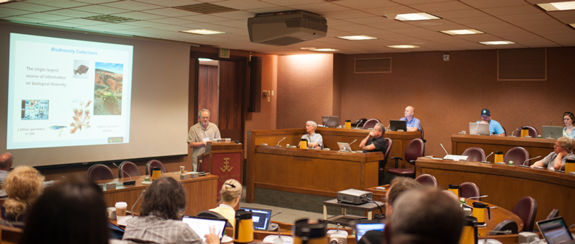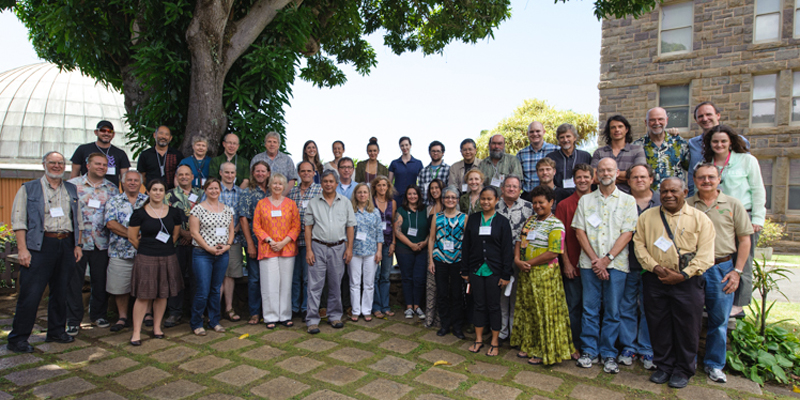 Serendipity played an important role in initiating the recent Biological Collections Digitization in the Pacific workshop held 25-27 March in Honolulu. Thanks to a chance meeting of Shelley James of the Bishop Museum, Michael Thomas of University of Hawaii, Burke Burnett, Pacific Science Association, Nancy Lewis, East-West Center, and Gil Nelson of iDigBio at the Pacific Science Inter-Congress in summer 2013, discussion began about how these organizations could collaborate on a digitization workshop focused on the Pacific region. James’ and Nelson’s participation in a digitization symposium at the Congress, coupled with Thomas’ previous work encouraging digitization in island nations of the South Pacific set the stage for a venture that culminated in 60 people from seven countries and territories congregating in Honolulu for the three-day event.
Serendipity played an important role in initiating the recent Biological Collections Digitization in the Pacific workshop held 25-27 March in Honolulu. Thanks to a chance meeting of Shelley James of the Bishop Museum, Michael Thomas of University of Hawaii, Burke Burnett, Pacific Science Association, Nancy Lewis, East-West Center, and Gil Nelson of iDigBio at the Pacific Science Inter-Congress in summer 2013, discussion began about how these organizations could collaborate on a digitization workshop focused on the Pacific region. James’ and Nelson’s participation in a digitization symposium at the Congress, coupled with Thomas’ previous work encouraging digitization in island nations of the South Pacific set the stage for a venture that culminated in 60 people from seven countries and territories congregating in Honolulu for the three-day event.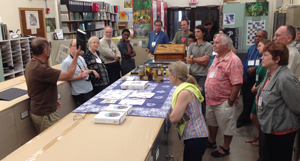 On the first evening of the workshop, participants were treated to a warm Hawaiian reception at the Bishop Museum, complete with several tours coordinated by Holly Bolick and highlighting the museum’s vertebrate, invertebrate, and plant collections. The open-air terrace outside the museum’s atrium was elegantly set to encourage eating, socializing, and professional camaraderie. Noa Detweiller, Division Manager for the museum’s Cultural Resources Division welcomed attendees on behalf of the Bishop, and PI Larry Page welcomed them on behalf of iDigBio.
On the first evening of the workshop, participants were treated to a warm Hawaiian reception at the Bishop Museum, complete with several tours coordinated by Holly Bolick and highlighting the museum’s vertebrate, invertebrate, and plant collections. The open-air terrace outside the museum’s atrium was elegantly set to encourage eating, socializing, and professional camaraderie. Noa Detweiller, Division Manager for the museum’s Cultural Resources Division welcomed attendees on behalf of the Bishop, and PI Larry Page welcomed them on behalf of iDigBio. 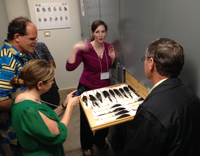
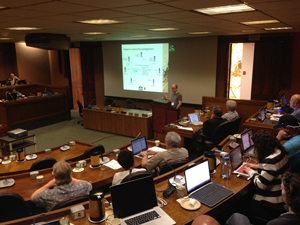 Workshop sessions spanned three days and two venues. Tuesday and Thursday activities were held at the East-West Center’s Asia Room, a United Nations-styled facility on the campus of the University of Hawaii. Wednesday’s activities were back at the Bishop’s Atherton Hālau, a thoroughly Hawaiian venue open to tropical breezes and surrounded by a terrace and garden. Late-stayers Wednesday evening were treated to extended hours and an opportunity to freely explore the museum’s fascinating public displays.
Workshop sessions spanned three days and two venues. Tuesday and Thursday activities were held at the East-West Center’s Asia Room, a United Nations-styled facility on the campus of the University of Hawaii. Wednesday’s activities were back at the Bishop’s Atherton Hālau, a thoroughly Hawaiian venue open to tropical breezes and surrounded by a terrace and garden. Late-stayers Wednesday evening were treated to extended hours and an opportunity to freely explore the museum’s fascinating public displays.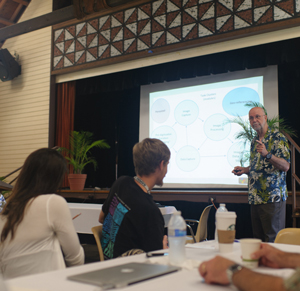
Several themes set this event apart from iDigBio’s previous workshops: a focus on international collaboration, a broad-based agenda reflecting digitization processes from multiple perspectives, and a heavier-than-usual focus on the production, management, aggregation, and distribution of data. The agenda, presentation documents, and session recordings are available for viewing and downloading at the workshop’s wiki: https://www.idigbio.org/wiki/index.php/PacificDigitization. iDigBio was delighted to host representatives from several Pacific nations and territories, including Australia, Palau, Guam, and Papua New Guinea, as well as Denmark, Canada, and the U.S.
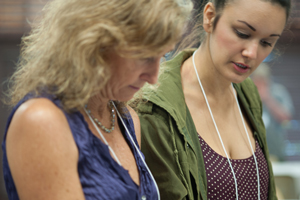 The first day of the workshop was devoted largely to international collaboration, funding opportunities, and project management. Following summaries of the ten currently funded ADBC Thematic Collections Networks, Donald Hobern, Executive Secretary of the Global Biodiversity Informatics Facility (GBIF) offered a keynote that focused on the importance of serving biodiversity data in a global environment. Judy Skog, Expert Consultant to the National Science Foundation and lead for the ADBC program, outlined her vision for the future of funding for biodiversity digitization activities and offered a what, when, where, and how perspective on NSF programs for funding collections. iDigBio’s project manager David Jennings outlined important considerations in managing funded projects. The afternoon culminated with a round-up of digitization activities in the Pacific that included updates on digitization activities in Guam, Palau, Australia, Papua New Guinea, Honolulu, and the National Tropical Botanic Garden, as well as progress on two ADBC-funded Thematic Collections Networks that involve the University of Hawaii and Bishop Museum.
The first day of the workshop was devoted largely to international collaboration, funding opportunities, and project management. Following summaries of the ten currently funded ADBC Thematic Collections Networks, Donald Hobern, Executive Secretary of the Global Biodiversity Informatics Facility (GBIF) offered a keynote that focused on the importance of serving biodiversity data in a global environment. Judy Skog, Expert Consultant to the National Science Foundation and lead for the ADBC program, outlined her vision for the future of funding for biodiversity digitization activities and offered a what, when, where, and how perspective on NSF programs for funding collections. iDigBio’s project manager David Jennings outlined important considerations in managing funded projects. The afternoon culminated with a round-up of digitization activities in the Pacific that included updates on digitization activities in Guam, Palau, Australia, Papua New Guinea, Honolulu, and the National Tropical Botanic Garden, as well as progress on two ADBC-funded Thematic Collections Networks that involve the University of Hawaii and Bishop Museum.
Days two and three focused on digitization activities common to a broad range of collection and preparation types and featured presentations on digitization workflows and components, pre-digitization curation practices across collection types, imaging strategies and protocols, data extraction from a range of collection objects, processes essential to effective data management, the importance of linking museum studies and libraries to biodiversity digitization practices, resources for public participation and crowd-sourcing, the importance of linking genomic data to specimen records, potential uses of digitized data, and strategies for education and outreach.
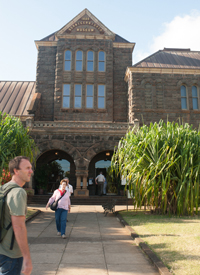 iDigBio appreciates the assistance provided by the Bishop Museum, University of Hawaii, East-West Center, and Pacific Science Association in bringing this workshop to fruition, and to the numerous staff members who contributed presentations and tours.
iDigBio appreciates the assistance provided by the Bishop Museum, University of Hawaii, East-West Center, and Pacific Science Association in bringing this workshop to fruition, and to the numerous staff members who contributed presentations and tours.